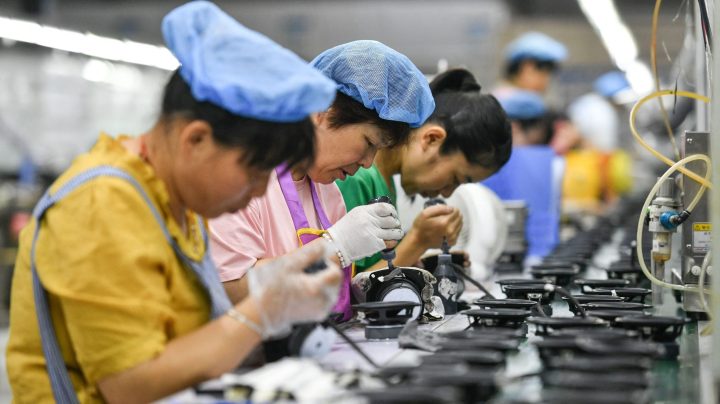
Why it’s getting more expensive to hire workers in China

At a tea shop in an affluent area in Shanghai’s Pudong district, colorful boxes of tea line wooden shelves that stretch up to the ceiling.
The boss, Janeva Zhang, has chosen to prepare a type of oolong tea, called tieguanyin, for our interview.
I started by asking her a simple question: How’s business?
“Business is,” Zhang said, then paused. “Do you want the truth?” she said, then laughed.
“After the pandemic, many clients who were big spenders have already run away,” Zhang said, using the popular term for emigrating. A lot of people have been talking about leaving after Shanghai’s strict lockdown last year. “I lost a lot of my big customers, and the rest of my clients don’t spend as often. Like if they used to buy our tea once a month, now it’s once every three months.”
In recent weeks, Beijing has announced a raft of measures to boost the economy, including for the private sector, though many of them do not contain a lot of detail. This comes after China’s economy from April to June grew at 6.3% compared to the same period last year, which some say was below market expectations. Small- and medium-sized businesses tell Marketplace that lowering the cost of labor would help — particularly reducing employer contributions to the social welfare system.
Last month, Shanghai’s government increased the amount employers pay into the social security system again, despite the fact that the city’s economy declined 0.2% in 2022. Shanghai increased the base figure used to calculate monthly contributions from 6,520 yuan ($909) in 2022 to 7,310 yuan ($1,019) this year. By Marketplace’s calculation, a lot of small- and medium-sized businesses have paid an extra 16% a year, every year, since the pandemic began in 2020.
“For a tea shop of our size that means I have to make an extra 100,000 yuan ($14,000) in sales revenue to cover the additional costs this year,” Zhang said.
High labor costs might make it harder for new graduates to enter the workforce. Logistics major Wu You was interning at a freight forwarding company, working in sales for the past year.
“My salary was 4,000 yuan ($560) per month plus commission,” said the 21-year-old. Since he was an intern, Wu said the company didn’t need to provide social welfare benefits.
“The company is very bad. I graduated this June. If I’d kept working there, the company would’ve had to pay my social insurance premiums. Instead, they asked me to leave because my sales performance wasn’t good enough,” he said.
Since then, Wu said his former company has hired another batch of interns.
“So they don’t need to give social welfare benefits,” he said. “A supervisor told me once that in the future they’ll only hire interns. In the meeting, he told me that doing so would reduce the burden of the company.”
Wu acknowledged that employers are asked to pay a lot into China’s social welfare system. It is at least 37% of a worker’s salary.

“We are one of the unluckiest graduating class,” Wu said. “If I graduated a year or two earlier in the middle of the pandemic, I could have earned more money, because when everything was shut down abroad, China’s factories were still operating. So we had a lot of exports.”
Wu believes that under better economic conditions, his former company would’ve kept him on.
He has left the logistics sector and works at a cosmetic surgery clinic as a receptionist. He makes a bit more than in his previous job, plus social welfare benefits.
Wu You is considered one of the luckier ones. One in five graduates like him are out of work.
Back at the tea shop, Janeva Zhang said two of her staff recently quit, though she is not in a huge hurry to replace them.
“The reason I could survive this pandemic is because I got a business loan using my condo as collateral,” Zhang said. She credits the government for providing such loans for small business owners to keep them afloat. “But for those who don’t have property [for collateral], they went out of business. … In the next three to five years, I think the only plan entrepreneurs have is to survive,” Zhang said.
Additional research by Charles Zhang.
There’s a lot happening in the world. Through it all, Marketplace is here for you.
You rely on Marketplace to break down the world’s events and tell you how it affects you in a fact-based, approachable way. We rely on your financial support to keep making that possible.
Your donation today powers the independent journalism that you rely on. For just $5/month, you can help sustain Marketplace so we can keep reporting on the things that matter to you.

















